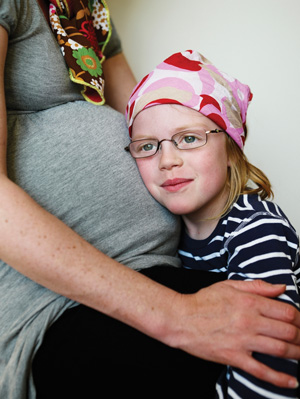All in the family

Becoming a mom is a life-changing event, but adding an […]

Sharing the news
When it comes to announcing a pregnancy to a big sibling-to-be, how and when you do it depends on your specific circumstances. If you have a toddler at home, it probably isn’t necessary to bring up your pregnancy until your belly begins expanding consider- ably. If 40 weeks seems like a long time to you, imagine how long it will seem to a 2- year-old! Sharing the news too soon could lead to frustration for your tot as the wait for his baby brother or sister seems to drag on and on.
Preschoolers and school-age children can usually be let in on the excitement sooner, since they’ll better understand the time it takes for a baby to brew. If your kiddo doesn’t yet have a grasp on the calendar, explain baby’s due date in a way that will make sense to her: “The baby will be in my belly all the way through winter and spring, and will arrive sometime in May, when it’s warm outside and almost summer break.” You can mark your due date on the calendar and cross off the days to help your child keep the time frame in perspective throughout your pregnancy; just be sure to mention regularly that the date in red is an estimate, and the baby will most likely not be born on that exact date but rather sometime around it.
To be on the safe side, many couples choose to wait until after the first trimester to share their good news. In some instances, you might decide to go ahead and let your child in on the secret earlier—say you’re suffering from severe morning sickness and your worry-prone kindergartner is concerned that something is wrong with you, for example. You know your child better than anyone else, so you’ll be able to gauge the right time to announce your impending addition. Whatever you do, make sure she hears the news from you and your partner and doesn’t overhear it in conversation or from a friend. If you tell other folks about your pregnancy before you’ve informed your little one,let those people know you haven’t yet spilled the beans.
Keeping it real
When most kids think baby, they think cute. Smiling, crawling, blowing bubbles … not a nonresponsive, possibly fussy newborn who they can’t really interact with all that much. Before you bring home the bundle, explain to your eldest what it will be liketo have a baby around—not only how the baby will behave, but also how your lives will change. Describe how mom might be busy nursing a lot, how mom and dad might both be more tired than usual and how a lot of people might come visit the new baby. There’s no need to sit down and have a formal conversation; keep the dialogue open and ongoing throughout your pregnancy. Answer questions honestly, and don’t feel like you have to sugarcoat every- thing. It’s better to be upfront about the possibilities—for example, some babies cry a lot, and some mommies really don’t feel well for a few days after having a baby —so no one is taken by surprise if things aren’t always sunshine and rainbows.
Of course, don’t dwell on the negative. Frequent reassurance will help the older sibling feel more confident about the coming change. Be sure to highlight positives too— like how much fun the baby will have with his big sister once he’s a little older, and how much big sister is going to enjoy having a younger sibling. Tell funny or sweet stories about when your firstborn was a baby, and share pictures of her first year adventures, pointing out how old she was in each shot. Above all, reassure your big kid how very, very special she is, and how much love you have for each of your children.

When the big day arrives, you’re not going to want any surprises. Before your due date, consider the possible scenarios you might be in when contractions hit and make sure you have childcare lined up for all hours of the day or night. If your older child will be staying with relatives or close friends she’s comfortable with, it might not be much of a change for her. But if a grandparent from out of town is coming to stay with her, or she’s staying away from home for the first time, she might be a little nervous about deviating from her regular schedule. Discuss who will be watching her while you’re away, how long you think you’ll be gone, whether the family will be able to visit you and thenew baby at the hospital or birthing center … Share as much as you can to help your youngster feel comfortable and secure when her sibling shows up.
Living the life
Once your new one arrives, find ways to ensure your big kid feels important. This isn’t always easy since babies can be time- consuming (understatement of the year, right?), but keep in mind that even a simple hug or kiss can make an older sibling feel loved. Invite your firstborn to come chat quietly with you while the baby nurses, have your partner handle the wee one’s bath so you can spend some time focusing on the older one, or ask someone to watch the baby for 30 minutes so you can enjoy a walk around the block or a quick ice cream run with big sister. Whatever you’re able to do, be sure to put as much attentionas possible on your first child, even if it is only for a short time each day. And don’t forget to invite your first- born to get to know her new little sibling. Encourage gentle hugs and kisses, and invite big sister to “teach” the baby by singing him songs and talking about what she knows best, whether it’s pointing out colors or rehashing Harry Potter for the fiftieth time. If she’s interested, she can also help you with tasks like bathing the baby and folding his clothes.
It might take a little time for everyone to adjust to your new routine, but the transition is oftentimes easier than you expect. Share the love, enjoy watching your offspring bond, and be confident in your ability to parent a duo—the good times are only just beginning!







